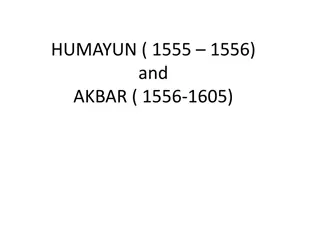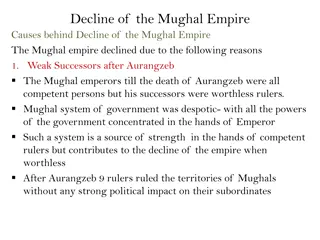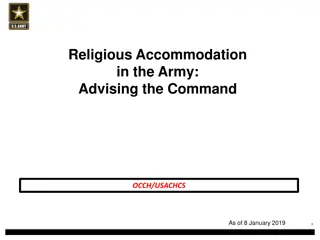Rajput and Religious Policy of Mughal Emperors: Akbar vs. Aurangzeb
Akbar, the first Mughal emperor, pursued a diplomatic policy towards the Rajputs, aiming to bring them under his suzerainty while maintaining friendly relations. His successor, Aurangzeb, adopted a more aggressive approach, seeking to annex Rajput kingdoms due to religious differences. This shift in policy led to varying responses from prominent Rajput rulers, impacting Mughal-Rajput relations significantly.
Download Presentation

Please find below an Image/Link to download the presentation.
The content on the website is provided AS IS for your information and personal use only. It may not be sold, licensed, or shared on other websites without obtaining consent from the author. Download presentation by click this link. If you encounter any issues during the download, it is possible that the publisher has removed the file from their server.
E N D
Presentation Transcript
B.A.(GENERAL) 2NDSEMESTER HISTORY OF INDIA 1206-1757 A.D UNIT 3 ( RAJPUT AND RELIGIOUS POLICY)
RAJPUT AND RELIGIOUS POLICY- AKBAR AND AURANGZEB Akbar was the first Mughul emperor who pursued a planned policy towards the Rajputs. Various factors participated in the formation of his Rajput policy. Akbar was an imperialist. He desired to bring under his rule as much territory of India as could be possible. Therefore, it was necessary to bring the Rajput rulers under his suzerainty. Akbar was impressed by the chivalry, faithfulness, dareness, fighting skill, etc. of the Rajputs. He preferred to befriend them instead of turning them as his enemies. He wanted dependable allies from among the Indian people instead of depending on foreigners. The revolt of the Afghans and his relatives, the Mirzas, during early period of his rule, further convinced him of this necessity. The Rajputs, therefore, became his good choice. The liberal religious policy of Akbar also directed him to be friendly with them. Akbar tried to befriend the Rajputs but at the same time desired to bring them under his suzerainty.
AKBARS RAJPUT AND RELIGIOUS POLICY Three following principles which he pursued regarding Rajput rulers: (a)He captured strong forts of the Rajputs like the forts of Chittor, Merta, Ranthambhor, Kalinjar etc. This weakened the power of the Rajputs to offer him resistance. (b) Those Rajput rulers who either accepted his sovereignty or entered into matrimonial relations with him voluntarily were left masters of their kingdoms. They were given high offices in the state and there was no interference in their administration. They were, however, asked to pay annual tribute to the emperor. (c) Those Rajput rulers who opposed him, were attacked and efforts were made to force them to accept his sovereignty. The case of Mewar was the best example of it. The Rajput policy of Akbar was a grand success. All Rajput states, except Mewar, accepted the sovereignty of Akbar. Those very Rajputs who were fighting against the Muslim rulers for the last three hundred fifty years submitted to Akbar and participated in the expansion of the Mughul empire.
AURANGZEBS RAJPUT AND RELIGIOUS POLICY Aurangzeb reversed the policy which was enunciated by Akbar and pursued by Jahangir and Shah Jahan. He was a bigot and the Rajputs were the greatest obstacle in persuance of his policy against the Hindus. Aurangzeb, therefore, attempted to destroy the power of the Rajputs and annex their kingdoms. There were three important Rajput rulers at that time, viz., Raja Jaswant Singh of Marwar, Rana Raj Singh of Mewar and Raja Jai Singh of Jaipur. All the three were at peace with the Mughuls when Aurangzeb ascended the throne. Raja Jai Singh was responsible for the defeat of prince Shah Shuja in the war of succession and after the battle of Samugarh had joined Aurangzeb. Raja Jaswant Singh fought against Aurangzeb at the battle of Dharmat, joined him a little later, but again left his side when he was going to give battle to Shah Shuja. Yet, when there remained no chance of success of prince Dara Shukoh, he was successfully persuaded by Raja Jai Singh to accept the service of Aurangzeb. Rana Raj Singh, the ruler of Mewar did not participate in the war of succession and, later on, accepted Aurangzeb as the emperor.
But, Aurangzeb never kept faith in the loyalty of these Rajput rulers. He deputed Raja Jai Singh in the Deccan where, ultimately, he died in 1666 A.D. Raja Jaswant Singh was deputed to defend the north-western frontier of the empire. Two of his sons died fighting against the Afghan rebels and he himself died at Jamrud in Afghanistan in 1678 A.D. Aurangzeb was waiting for this opportunity. At that time, there was no successor to the throne of Marwar. He occupied Marwar immediately and, with a view to disgrace the ruling family, sold the throne of Jaswant Singh for rupees thirty-six lakhs. It seemed that the existence of Marwar was lost forever. But, Marwar was saved. While returning from Afghanistan, the two wives of Raja Jaswant Singh gave birth to two sons at Lahore. One of them died but the other named Ajit Singh remained alive. Durga Das, the commander-in-chief of the Rathors came to Delhi with the prince and requested Aurangzeb to hand over Marwar to Ajit Singh. Aurangzeb did not agree. He offered to keep Ajit Singh with him, till he would have become young. Durga Das, having recourse to a stratagem, succeeded in escaping to Marwar with the prince and his mother. Ajit Singh was declared the ruler of Marwar and the war of independence of Marwar began from that time. Rana Raj Singh of Mewar, who realized that it was in the interest of Mewar also to fight against the Mughuls, gave support to Marwar. In 1681 A.D., Akbar, son of Aurangzeb revolted against his father with the support of the Rajputs. The revolt of Akbar failed and he fled to Maharashtra under the protection of Durga Das. Aurangzeb offered peace to Mewar and it was accepted. The Rathors, however, continued their fight against the Mughuls. Pursuing his son Akbar, Aurangzeb left for the Deccan and could never come back from there. Marwar fought against the Mughuls till the death of the Emperor in 1707 A.D., of course, accepting peace in between twice, and finally succeeded in gaining its independence. Thus, Aurangzeb failed to subdue either Mewar or Marwar. The only result of his policy against these states was that he lost the support of the Rajputs. The Rajputs, who were one of the best supporters of the Mughul empire since the reign of Akbar, revolted against Aurangzeb. Their services could no more be utilised in strengthening the Mughul empire. On the contrary, it added to the troubles of the empire. It encouraged other revolts also. Thus, the Rajput policy of Aurangzeb failed and its failure contributed to the failure of Aurangzeb and resulted in weakening of the Mughul empire. During the rule of the later Mughul emperors the Rajput rulers gained virtual independence and owed only nominal obedience to the Emperor.
REFERENCES www.historydiscussion.net

















































